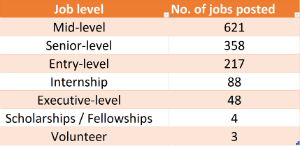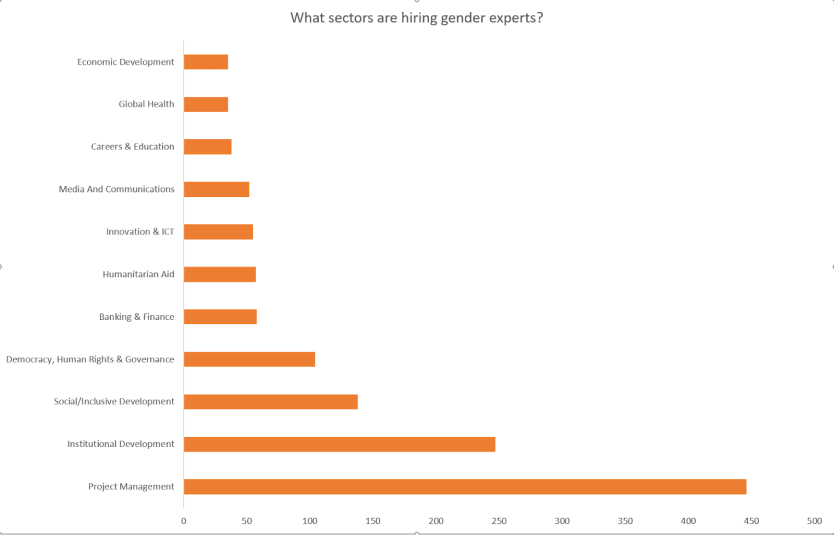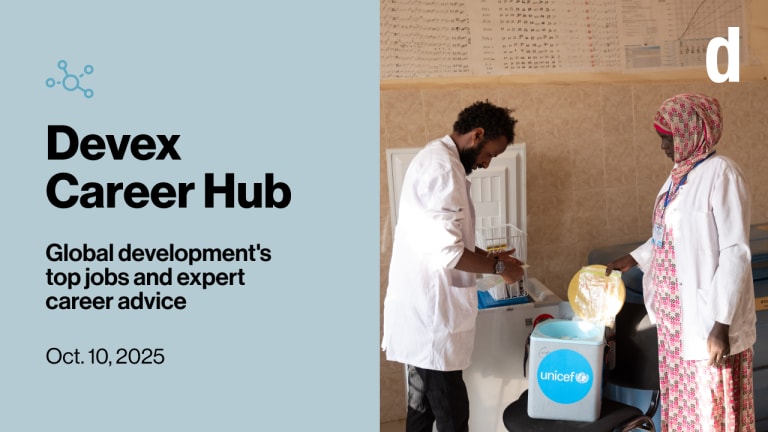
Gender is a critical and crosscutting issue in many areas of development policy and programming. In addition to the fifth Sustainable Development Goal, which focuses on achieving gender equality, expertise on gender is required to meet many of the other SDGs, including those around climate action, economic growth, education, and sustainable agriculture.
More than 1,400 jobs related to gender have been posted on Devex’s job board over the past 120 days, offering a snapshot of where gender experts are in demand.

More than half of the jobs posted were for middle- or senior-level professionals. United Nations agencies were responsible for more than one-third of the entry-level positions and most of the internships posted.
Around 9% of the jobs were for consultants, but organizations were also seeking project management officers, human rights officers, chiefs of party, project specialists, and emergency gender-based violence managers, among other roles.
Which sectors are hiring gender experts?
Almost one-third of the postings were in project management, where some of the key skills required are grant management, monitoring and evaluation, administration, and accountability. Institutional development accounted for 17% of the jobs posted, while inclusive development accounted for 10%. Energy, urban development, and the private sector were the areas where there was the least hiring for gender experts.

Where are the jobs?
In terms of location, by far the largest share of the jobs advertised, at 22%, were based in the U.S. — in part, perhaps, because of the dominance of U.N. agencies in the hiring figures.
This was followed by worldwide positions — those undertaken remotely, many of which were consulting positions — and Switzerland, which each accounted for 3% of the jobs.
Kenya and the Democratic Republic of the Congo each accounted for 2%. The other top locations were India, Thailand, Bangladesh, Ethiopia, Iraq, and Sudan.

Which organizations are hiring?
The three biggest employers of gender experts during this time period were all U.N. agencies. UNICEF advertised 144 positions relating to gender expertise, of which 9% were based in the U.S., where the agency is headquartered. The positions ranged from communications and advocacy to community health, planning and budgets, and public partnerships.
UNICEF was hiring for 6% of its roles in Syria, where it sought professionals with expertise in child protection, logistics, social policy, and prevention of sexual exploitation and abuse.
There was also significant hiring in Chad, Rwanda, Jordan, the Democratic Republic of the Congo, and Nigeria, with six jobs posted in each of these countries.

The U.N. Development Programme, meanwhile, was looking to fill numerous positions for people with gender expertise, including remote workers. In Malaysia, it was seeking consultants for the formulation of policies related to national education, culture, health, economics, and land rights. There were also several opportunities for interns to work as part of the UNDP Accelerator Labs or U.N. Technology Innovation Labs — the global learning networks set up to test and scale solutions for different development challenges. A large share of jobs were also posted for Sri Lanka, where project coordinators were particularly in demand.
Which global dev employers are hiring climate experts?
Devex takes a look at the hiring trends around climate work in the global development sector.
The third-biggest employer of gender experts during the past four months has been UN Women, which was doing most of its hiring in the U.S. — where the agency is headquartered — followed by Barbados and Egypt. While most of these positions were in project management and social or inclusive development, there was also significant hiring for roles spanning agricultural and rural development, democracy, human rights and governance, economic development, and media and communications.
Outside of the U.N., the top employer was Chemonics International. Again, most of its hiring — 39% — was for roles in the U.S., but the company was also looking for gender experts in Bangladesh, which accounted for 22% of its jobs. Chemonics was hiring chiefs of party, in particular, for openings mostly in Asia and Africa.
Devex, with support from our partner UN Women, is exploring how data is being used to inform policy and advocacy to advance gender equality. Gender data is crucial to make every woman and girl count. Visit the Focus on: Gender Data page for more. Disclaimer: the views in this article do not necessarily represent the views of UN Women.









